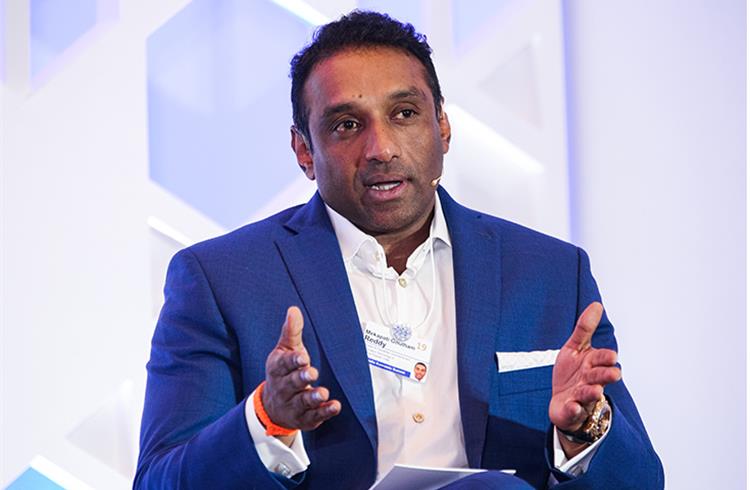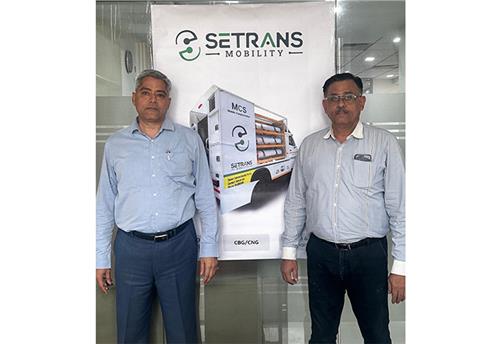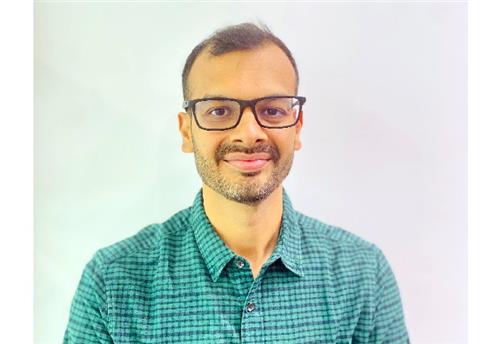Mekapati Goutham Reddy: ‘Andhra Pradesh’s EV policy aims to attract Rs 30,000 crore of investment by 2030.’
Andhra Pradesh, located in the south-eastern coastal region of India, has suddenly shot into the automotive limelight and emerged as a strong hub. Mekapati Goutham Reddy, Minister of Industries, Commerce, IT & Skill Development, Andhra Pradesh, reveals how the state government is enhancing its ease of doing business.
Andhra Pradesh, located in the south-eastern coastal region of India, has suddenly shot into the automotive limelight and emerged as a strong hub. Mekapati Goutham Reddy, Minister of Industries, Commerce, IT & Skill Development, Andhra Pradesh, reveals how the state government is enhancing its ease of doing business with pro-active administration and industry-supportive policies, aiming to accelerate adoption of e-mobility, targeting higher exports, plans for an auto electronics cluster in Anantapur and also skill colleges to create an industry-ready workforce.
The past few years have seen Andhra Pradesh speedily transform into a promising automotive hub, drawing big-ticket investments. When did the state government first decide on targeting the auto industry?
It is befitting here to mention that the journey towards industrialisation accelerated during the tenure of the late chief minister, Dr Y S Rajashekar Reddy. During his tenure, the government has undertaken structural reforms to accelerate the industrialisation in the state. This has created a conducive atmosphere for companies across the world, not only in automotive but also in all other sectors to come and set up operations in Andhra Pradesh.
Also, the state has inherent advantages — the second longest coast line of 974km, quality infrastructure coupled with a congenial industrial environment, growing middle class, abundant natural resources and, more importantly, a stable government which is a deal- clincher for global investors. These factors have helped us attract global auto investors to the state.
What have been the key steps taken by the state government to make Andhra Pradesh an investment-friendly destination? What are the key incentives offered to the auto industry?
The key differentiators for the state are the availability of encumbrance-free industrial land at affordable rates, utility cost (water/power) at reasonable prices, and availability of skilled manpower. The state is situated at a geographically advantageous location with a long coastline and positioned at a logistically efficient location to access domestic markets in south and East of India.
Today, we are No. 1 state when it comes to the ease of doing business and our government is now
focusing reforms at state and district level to bring down the cost of doing business. We are soon unveiling a new industrial policy which will be focussed on creating clusters and achieve scale through focus on developing infrastructure and common facilities.
To sum up, our natural geographic advantages, coupled with our efforts to lower cost of doing business, and transparent governance will build confidence among the investors to choose Andhra Pradesh as their preferred destination.
How much has the Indian and global automotive industry invested in the state in the past two years?
Andhra Pradesh is home to investments from South Korea, Japan, Taiwan, and France. Over the past five years, the state witnessed Rs 19,765 crore of investment which has generated 32,730 jobs. The southern part of the state, particularly Nellore, Chittoor and Anantapur, are emerging as major automotive hubs. Leading marques like Kia Motors, Veera Vahana, Isuzu, Hero MotoCorp, Amara Raja, Apollo Tyres and Bharat Forge have established units in these three districts.
Andhra Pradesh had received interest from around eight new automotive companies to set up operations in India. What is the progress on this?
Yes, we have been in talks with few major auto players and a few are in advanced stages. We will disclose the details of the companies at an appropriate time.
The current geo-political tension between India and China has impacted investments from Chinese companies. Is there an impact on Andhra Pradesh?
We would always like to think long term and act accordingly. The current tensions are not specific to India alone. If you see the big picture, a global shift away from China is underway as companies decide to diversify their supply chains to be more resilient and that is an opportunity we want to capture.
The state government constituted a task force formed for attracting investments on a long-term basis into the State. As part of the forum, we have targeted to reach out to specific countries like USA, South Korea, Japan, Taiwan, Vietnam and Singapore and are currently exploring avenues of collaborations and partnerships.
How has the Covid-19 pandemic impacted your plans to establish industrial clusters and investments from OEMs?
The Covid-19 outbreak has placed the entire nation and the state under a magnifying glass and the automobile sector is one of the worst hit. I would say that this pandemic certainly impacted the state’s plans to set up clusters and investments from OEMs. Despite the adverse impact of Covid-19, we viewed this situation as a period of realignment and readjustment.
Also, the state government has announced a Rs 1,100-crore ‘ReSTART package’ for MSMEs. This includes the payment of all sanctioned but outstanding incentives to MSME units, waiver of three months’ fixed demand charges for MSMEs, deferment of power minimum demand charges for three months for large and mega units, and working capital loans for MSEs along with preferential market access for MSEs.
I would like to reiterate that this pandemic has redefined the development policies, government priorities, responsibilities of businesses and citizens, and metrics for measuring development progress across the world.
At 974km, Andhra Pradesh has the second largest coastline in the country after Gujarat. How do you plan to develop it and attract companies? Carmakers like Kia Motors India have plans for large exports.
Yes, the state has the second longest coastal line of about 974km in India. Visakhapatnam is the major port along with 14 notified ports, out of which five are functional and act as a gateway to East and South East regions of Asia. As per statistics, in FY2019-20 (up to September 2019), a total of 73 million tons of cargo were handled by state ports and the exports from the state were valued at Rs 49,221.62 crore.
The state government is contemplating a vision plan for infrastructure creation including integrated development of a port-led industrial ecosystem, leveraging the state's coastline, part of the East Coast which faces progressive south-eastern nations and industries that can help the state emerge as a business hub.
In this connection, the state government has given utmost priority to develop a new port — Ramayapatnam sea port — under PPP mode, modernise existing minor ports and also set up port-based industries along the industries corridors (VCIC corridor and CBIC Corridor).
While Covid-19 has impacted the trade markets, it has also opened a window of opportunity as countries look away from China to reduce their import dependency. The state government has increased its efforts to enhance export volumes from Andhra Pradesh and scale up production to achieve the set target of doubling exports in the next five years. We hope these initiatives certainly reinforce to attract more export-oriented FDI into the state.
You have the Bus Rapid Transport System (BRTS) in Visakhapatnam and Vijayawada. How is it faring and what is the commuter response?
The state government has developed BRTS — a 15.5km pilot corridor in Vijayawada and 40km of corridor in Visakhapatnam under Jawaharlal Nehru National Urban Renewal Mission.
As part of the smart city initiative, the Vizag BRTS has seen some progress in terms of upgradation by integrating technology, better amenities at bus stops to provide real-time information to the passengers. Other facilities will include interior lighting powered by solar cells, precision bus docking, all-doors boarding, developing high visibility crosswalks and improving drainage provisions at stations.
Some other states have announced specific EV industry-friendly policies to drive electric mobility. What is the status of the state’s EV policy? How do you plan to differentiate and incentivise OEMs and consumers to increase EV manufacturing and sales?
The state has unveiled ‘Electric Mobility Policy 2018-2023’ with an aim to support every aspect of electric mobility and accelerate adoption of EVs that eventually leads to a healthier environment. This policy mainly emphasises and encourages manufacturers, charging infrastructure, demand creation, research and development.
Andhra Pradesh’s EV policy is looking to attract Rs 30,000 crore of investment by 2030. It is also looking to create jobs for 60,000 people. The state government also aims at making all commercial vehicles go electric by 2030.
It is understood that this October, a foundation stone ceremony is planned for five world-skill colleges in the state. Under this initiative, will there be a focus on the automotive sector, given the growing demand for such skills in the state?
The state’s development agenda is critical with respect to meeting industry workforce requirement and promotion of gainful employment. We are ascertaining demand and supply across the sectors and addressing the issue of ‘skills gap’ institutionally.
The State government proposes to establish a Skill University and 30 world-class Skill Colleges. These colleges will be established with sectoral emphasis drawn from the industries and the industrial clusters in the proximity and create a synergistic ecosystem for the supply and demand and serve as a trigger to the local economy.
We have proposed that the Skill College in Anantapur will have specialisation in automobile engineering in collaboration with Kia Motors, where courses to develop workshop managers, testing managers, prototyping and product conceptualisation managers, body shop incharge, product design and prototyping engineers, casting-line specialist and automation in charge, and casting technician will be offered.
Currently APSSDC (Andhra Pradesh State Skill Development Corporation), in collaboration with Kia Motors, has been offering Kia-customised trainings in the Kia Unit (Penukonda) and at the Government Polytechnic College, Anantapur.
Kia has deployed its trainers to deliver the training as per its curriculum and offer captive placement to the candidates. Thus far, 2,000 have been placed including the apprentices.
The government of India has rolled out an AI-based ASSEM digital platform to bridge the demand-supply gap of skilled workforce across sectors. Is Andhra Pradesh planning a similar initiative?
The government is building a digital platform to match skilled labour in Andhra Pradesh with the requirements of businesses to be set up. The platform will be developed in collaboration with start-ups operating in the space. Apart from this, the state government is conducting surveys that ascertain demand and supply status of workforce.
The Department of Industries is conducting ‘Samagra Parishrama Survey 2020’, a comprehensive survey that captures industrial requirements specific to factors of production, particularly identifying the industry skill gap specific to the quality of skills required and requirement by industries, and availability of workforce.
The state has also announced several key partnerships between industry and academia to develop skill training courses. What is the core focus for them?
Noteworthy partnerships include Johnson Controls-Hitachi, which has committed to set up five model skill development centres in the air-conditioning segment across Andhra Pradesh in a phased manner through their CSR initiative at the cost of Rs 30 lakh per centre.
Siemens Program: Under the Siemens Training Centers, APSSDC-Siemens is to train a large number of unemployed youth for employability and to create industry relevant technically skilled workforce. This Centre of Excellence (CoE) functions as a centre of higher learning and research with an annual capacity to train 20,000 people. This program offers more than 125 industry certification courses in the manufacturing, electrical and electronics domains, automation and agricultural sectors. So far APSSDC, in collaboration with Siemens, has trained 138,672 candidates across Andhra Pradesh. Following the training, due to the advanced skill set possessed by the trainees, companies like Sakura, Yamaha, Medha Servo, Mando and Spice are showing interest in recruiting them. Placement activities for the trained students have commenced.
Dassault Systemes: APSSDC in collaboration with Dassault Systemes has established a best-in-class virtual learning centre (3D-Experience Centre) to train students in design, manufacturing and analysis in the domains of aerospace, automotive and shipbuilding domain, thereby creating industry relevant technically skilled workforce.
The Indian auto industry lags behind in electronics manufacturing and is dependent on imports for key parts. Is Andhra Pradesh, which has a strong base of young engineering graduates, thinking of an auto electronics cluster?
Alongside the automobile and auto components industries, electronics is one of the focus sectors for the state due to the interlinkages of electronics into different industries. We already have two government EMCs in Tirupati and one private EMC in Sri City. We plan to develop three more in Chittor, Anantapur and Visakhapatnam focussing on consumer electronics, defence and automotive electronics, and medical electronics respectively.
The auto electronics manufacturing cluster in Anantapur will be deriving its synergies from its proximity to Bengaluru, and the existing Kia Motors and its ancillary ecosystem.
The state is also a mining hub — do you think a gigawatt battery plant is feasible? If yes, which companies have evinced interest in setting up such a unit? And how do you plan to set up mass-scale EV charging infrastructure?
Yes, the establishment of a gigawatt battery plant would be feasible as the state has all the required soft and hard infrastructure. In fact, we have extended certain incentives for battery manufacturers as part of the EV Policy 2018-23. We are in talks with a few global players, which are at initial discussions only.
One of the key priorities under the Electric Mobility Policy 2018-2023 is to create charging infrastructure. In this regard, NREDCAP set up 50 charging stations (Bharat EV Charger DC-001) with CMS (Central Management System), five-year onsite warranty and annual maintenance contract in six locations (Vijayawada, Visakhapatnam, Amaravati, Guntur, Tirumala and Tirupati), which were commissioned during 2018-19. Also, NREDCAP plans to set up 250 charging stations for EVs in Visakhapatnam, Vijayawada, Tirupati, Amaravati, Guntur, Nellore and Kakinada at an estimated cost of Rs 20 crore; 1,000 EVs are the target of the fiscal year.
MoRTH has said that the vehicle scrappage policy is in an advanced stage. Do you also plan to set up a vehicle scrappage cluster?
During my visit to Auto Expo 2020, I interacted with a few national and global players; they demonstrated their ambitious plans on vehicle scrapping and made representations on the kind of support required from the state government.
At this juncture, I would say we are looking closely at the opportunities available in this segment to tie up with the long-term development of the state. We are working internally to assess the demand parameters and suitable locations to establish the vehicle scrappage cluster.
It is understood that the state government is developing auto clusters in the Nellore and Chittoor districts and also focused component manufacturing centres. What is the status on this?
As I said earlier, we are receiving investment proposals regularly from automobile investors to set units in the Nellore and Chittoor districts as they are close to the existing industrial clusters of Tamil Nadu and Karnataka.
Yes, we are planning to earmark a dedicated auto cluster focussing on creating an EV ecosystem in an area of 2,500-3,000 acres.Currently, the department is evaluating best global practices in terms of the implementation structure and will shortly come up with a feasible model.
How does Andhra Pradesh rank in the ease of doing business compared to other Indian states?
We are consistently ranked as the No. 1 state in the ease of doing business. We are further strengthening the ease of doing business by focusing on achieving ‘low cost of doing business’ through hassle-free change of land use, registration and title transfer, simplified labour laws, and approvals through single window portal etc. Currently, we are focusing on district-level ease of doing business with the Business Reform Action Plan (BRAP).
The Andhra Pradesh Economic Development Board is the single point of contact for investors and dedicated support and is being provided by the team.
What kind of investment are you targeting in the automotive, transport and logistics sectors by the year 2025? As global OEMs and component suppliers are looking to de-risk their operations from China, are you already talking to companies and have some approached you?
Specific auto component companies need to be targeted — engine parts, suspension and braking parts, drive transmissions and steering parts and major focus towards EVs led by the public transportation requirements in India — fleet cars, e-buses, three- and two-wheelers.
Yes, the economic issues and supply chain constraints caused by Covid-19 resulted in many countries rethinking their investments in China. To utilise this opportunity, we have initiated virtual interactions with international trade associations to really understand the investor requirements. As part of this, we have interacted with renowned associations from Japan, USA, Taiwan, South Korea, Singapore and Italy.
Finally, what is your message to the auto industry looking to expand or set up operations in the state and India?
The AP government firmly stands to provide pro-active administration, capable manpower and supportive policies to enable the industries in the state. With a promise to provide high-quality human resources for enterprises, Andhra Pradesh is creating its own streak of development that integrates rapid economic growth, ease of doing business propelled by technology and innovation through an inclusive and participatory development. I welcome you to an all-new industry experience. Come and explore Andhra Pradesh, ‘where abundance meets prosperity’.
(This interview was first published in the August 1 issue - South India Special)
RELATED ARTICLES
Setrans Mobility Booster Charging top-up 25% EV range in 15 minutes
Two enterprising tech-savvy entrepreneurs Rana Roshan Singh and Vivek Ummat of Noida, Uttar Pradesh-based start-up Setra...
'Our products are proudly 100% designed and made in India'
Creatara Mobility, a New Delhi based electric two-wheeler startup, claims to have tackled various challenges in making i...
'EVs have been around for a much smaller time than ICE, so best practices are still evolving'
EV OEMs and start-ups are under pressure to reduce production costs and bring them close to ICE counterparts. Vaibhav Ku...





 01 Sep 2020
01 Sep 2020
 33458 Views
33458 Views





 Autocar Pro News Desk
Autocar Pro News Desk




